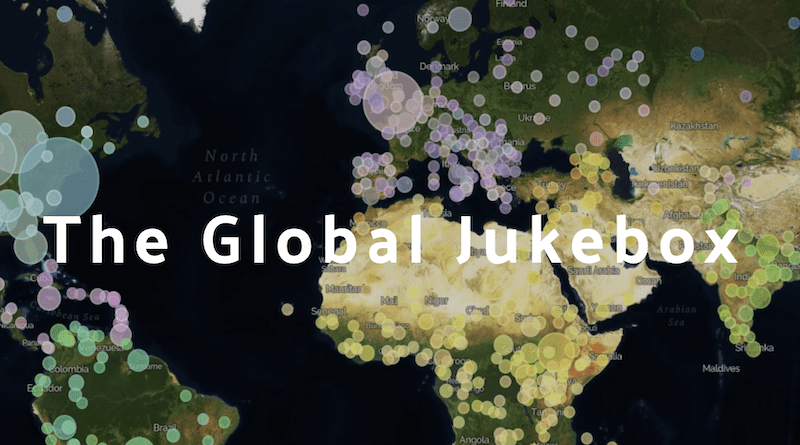‘Global Jukebox’ Performing Arts Database Now Publicly Available
Extensive data behind the Global Jukebox (http://theglobaljukebox.org) —an online tool for exploring recordings of music and other performing arts from around the world—has now been made available to the general public and researchers. Anna L. C. Wood of the Association for Cultural Equity (ACE), Hunter College, New York City, Patrick Savage of Keio University, Fujisawa, Japan, and 17 colleagues report and demonstrate this new resource in the open-access journal PLOS ONE.
The Global Jukebox relies on a dataset that includes traditional songs representing 1,026 societies. Many of the recordings were captured by ethnomusicologist Alan Lomax, who categorized them according to different features of musical style, such as number of singers, vocal embellishments, and various rhythmic and melodic qualities; 37 such features are now included for each of the 5,776 songs in the Global Jukebox dataset.
A preliminary version of the Global Jukebox tool launched in 2017, and the underlying database is now available for anyone to download. Before release, Wood and colleagues assessed and refined the 5,776-song dataset, including associated musical style categorization data, to ensure accuracy. They have also released several additional sets of categorized data on various other features of musical recordings, including breath management and instrumentation, as well as non-musical data on different societies, including conversational styles.
The researchers hope that the database will inspire and enable other researchers to conduct diverse, cross-cultural investigations of musical traditions and cultural evolution. To demonstrate, they used the database to examine the relationship between a society’s level of sociopolitical complexity and key features of its songs, finding statistical correlations between the two; however more research will be needed to identify the underlying mechanisms.
In preparing the database for release, the researchers made efforts to ensure that it will support cultural equity in research projects that rely on its data. In addition, all recordings are only available to the extent that copyright and the preferences of culture-bearers allow.
The researchers have planned for continued improvement of the database. For instance, they plan to add song recordings for societies and regions, such as Polynesia, that are currently underrepresented in the data.
Dr. Anna Wood adds: “Access is so important. More than anything else, my father wanted people who are being cut off from their ancestral cultures — drowned, as under the waters of a new dam — to hear their songs and to find their aesthetic footprint in their own ‘big traditions’. So while the Global Jukebox is highly technical, it is also a place everyone can explore. Our job at the Association for Cultural Equity is to find more ways of inviting people in.”
Assoc. Prof. Patrick Savage adds: “I’m honored to be part of making these priceless recordings and accompanying scientific data finally available for the whole world to freely use, including scientists interested in understanding cultural diversity, members of the original communities wanting to strengthen their traditions, and members of the general public wanting to learn more about the beauty and diversity of all the world’s music.”

